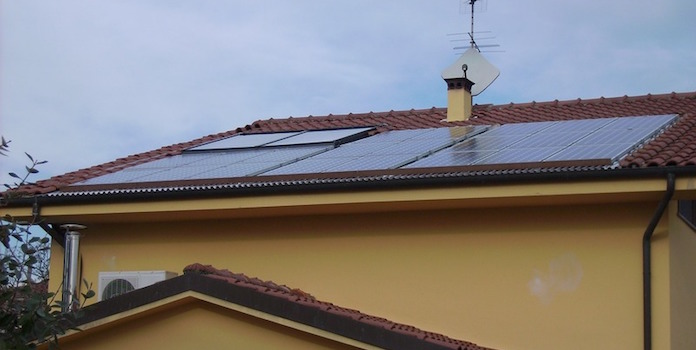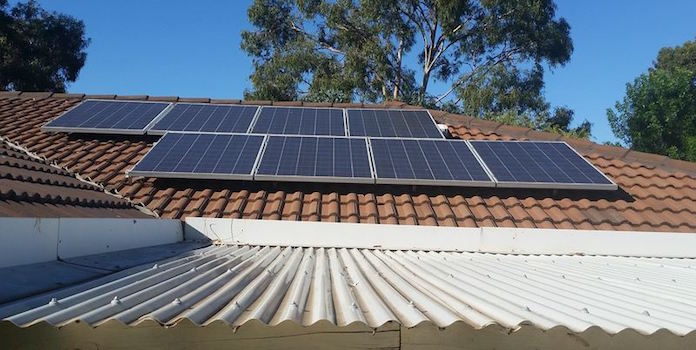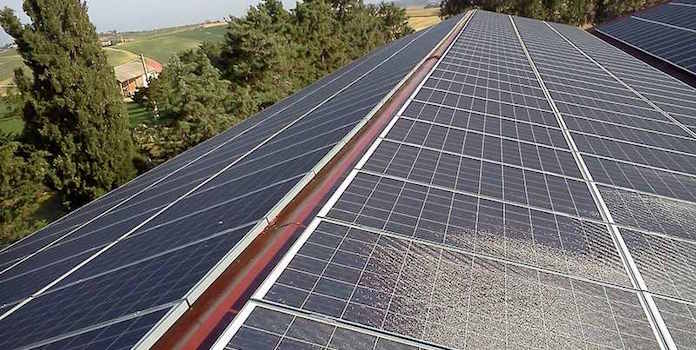Is Purchasing Solar Panels in Cash Better than a Lease or Loan?

Looking to install solar, but not quite sure how to pay for it?
There’s actually a few different options for purchasing solar panels, from simply paying cash to taking out a loan or lease.
Which one’s best? Let’s run through each and discuss their pros and cons, as well as which one you should choose and why.
Purchasing solar panels in cash
⇑ Pros:
- Highest savings
- You own the system
- Eligible for tax credits
- Added value to your home
⇓ Cons:
- Expensive initial investment
- Funds are tied-up for several years
If you’re looking to save as much money as possible, consider purchasing your solar installation outright. You’ll avoid the loan interest and lease payments that dig into your overall savings and as the sole owner of the installation, you’ll also be able to take advantage of any financial incentives or tax breaks to lower your overall investment. This includes the 30% federal tax credit set to expire in 2019.
You’ll not only save more, but you’ll add value to your home as well. A 2015 study from the federally-funded Lawrence Berkeley National Lab found that, from 1999 to 2013, home buyers were willing to spend an extra $4/watt on average for homes with solar installation owned by the homeowner (so no leases, though loans are okay). At this rate, a medium-sized 5kW installation is worth about $20k when it comes time to sell your house.
Cash is also the easiest financing option. You pay the installer. They install. You’re done. No long term commitment. No lease contracts. It’s simple and efficient.
Let’s do some math to see how much you can save by purchasing solar in cash.
With solar costing about $3.05 per watt on average in the US (which we gleaned from several sources, including the National Renewable Energy Lab (pg. 5), that 5kW installation mentioned above costs about $15,250 before any incentives.
Average installation cost:
With most solar installations taking about 8 to 12 years to recoup the initial investment, it is quite a long time for your money to be tied up.
However, if you can afford it, that 5kW installation will produce some serious financial perks over the long run! Looking at average energy productions from several states across the US, that 5kW system will produce about 162,000 kWh over the next 25 years (or 6,480 kWh a year). The average utility in the US charges $0.13 per kWh for electricity as of 2017, with a 2.6% price increase each year. After 25 years, you’d spend about $29,441 in total if you bought all that from the utility.
Cost of energy over 25 years:
Installing a 5kW PV system can save you about $14,191 over the 25 year average lifespan of your panels.
Savings over 25 years:
Now let’s throw in the 30% federal tax credit:
Installation cost minus tax credit:
You can see your costs dropped almost $5k, so your savings jump to $18,766 (though you’ll need to ensure your tax liability is high enough to claim this non-refundable credit).
Total savings:
Even without the federal tax credit, that’s a 48% drop in your electricity costs, all while helping build a cleaner world and more resilient energy infrastructure. Seems like a pretty smart investment to us!
Bottom Line: Solar’s all about saving money and seeing a healthy financial return. If your bank account can handle a long-term investment, cash is your best option to meet this goal.
Loans
⇑ Pros:
- Little to no money down
- Own the system like a cash purchase
- Eligible for all tax credits and incentives
- Cash isn’t tied up in investment
- Adds value to your home
⇓ Cons:
- Lower savings when compared to cash
Solar loans came about as an alternative to purchasing solar in cash or entering into a lease agreement. Taking out a loan to pay for your solar installation allows you to avoid that huge initial investment required for a cash purchase, but you still retain ownership of the system so you’re eligible for all the financial perks like the federal tax credit.
For those of us with, um, smaller bank accounts, taking out a loan is probably the best option to go solar. Depending on your location, there are many types of loans that can finance your solar project.
If you’re interested in taking out a Home Equity Loan (HEL) or Home Equity Line of Credit (HELOC), talk to your bank or credit union. Some banking institutions even offer special loans for renewable or efficiency projects. Boulder, Colorado’s Elevations Credit Union, for example, works with Boulder and Denver Counties to offer low-interest Home Energy Loans for energy efficiency and renewables projects.
Fannie Mae and the FHA also back loans or mortgages that finance renewable or efficiency projects, so talk to your mortgage lender if you’re interested in these.
Lastly, solar companies typically have a finance company ‘on call’ that offers secured or unsecured loans. Take a look at our article Options for Solar Power Loans: From FHA to Home Equity for more info.
While avoiding that investment hurdle is the main draw for solar loans, the main drawback is the lower overall savings due to all that interest you have to pay. The loan company’s got to get something for letting you borrow that cash, right?
How much are those interest payments going to cost you? Let’s see:
Let’s say you secured a 12-year loan with 5% interest to pay $15,250 for the 5kW installation above. After Year 12, you’ll have paid off the entire loan and paid $5,061 in interest.
Add interest:
This increases your total investment to $20,311, dropping your total savings to $9,130.
Total savings:
That seems like a big drop, but consider that you’ve would’ve spent $29k on electricity if you never installed solar, so you’re still seeing about a 31% discount on your electricity costs.
Of course, if you can find a loan with lower interest rates, or can handle a shorter length, your total interest payments will be lower and your total savings will increase. Keep this in mind. Don’t just go with an offering from your solar installer or bank. It’s worthwhile to shop around to find the best possible deal.
Bottom Line: If you don’t have the cash to purchase solar outright, loans offer a way to avoid that initial investment, with lower – albeit still worthwhile – savings.
Solar leases
⇑ Pros:
- No money down
- No maintenance or repair responsibilities
⇓ Cons:
- Lower savings
- Solar company retains ownership
- You pay ‘full price’ for installation
Sunrun, the 2nd largest residential solar company in the US, introduced solar leases back in 2007 as an alternative to purchasing in cash. With a solar lease, the solar company pays for, installs, and maintains the system. You get to use all the power produced by the system and make monthly payments, typically over 20 years, for the use of the equipment.
Sunrun, as well as other solar companies, claim you can knock about 20% of your electricity costs by going solar with a lease – a far cry from cash’s 50% or even loan’s 30% savings.
When first introduced, homeowners jumped on the leasing bandwagon, as it was the only option other than purchasing in cash. Today, solar leases are decreasing in popularity, as more homeowners see the benefits of solar ownership and either purchase in cash or take out a loan.
Since the installer retains ownership of ‘your’ installation, they – not you – are eligible for the 30% federal tax credit, leaving you to pay ‘full price’ for your installation. Many installers claim they pass on this discount to you through lower monthly payments, but these companies actually sell the tax credits to banks or other organizations as a way to increase profits (or at least decrease costs).
This doesn’t leave much room for installers to lower homeowners’ monthly bills – 2 people can’t benefit from the exact same tax credit.
Bottom Line: Solar leases, like any other type of lease, are a great way for the issuing company to make money. If you’re looking to increase your financial savings from going solar as much as possible, but can’t afford to pay in cash, look into solar loans instead.
In the end, purchasing solar panels is a decision only you can make. Each financing method has its own benefits and drawbacks.
If you don’t have the cash, take a look at securing a loan to finance your installation – you’ll be better off in the long run than if you went with a leasing option. If you’ve got the cash and gumption to go all in, you’ll save the most by laying out the cash upfront.
Next steps to purchasing solar panels
Now that you know about the different financing options, take some time to think about your own situation. Are you ready to invest your hard-earned cash for several years, or does a loan make more sense?
As always, talk to a few installers and/or lenders to see what’s out there. Look at a few different financing options and take some time to secure the best deal possible. The more time you spend finding the right financing, the more you stand to save and the happier you’ll be with your new solar installation!


